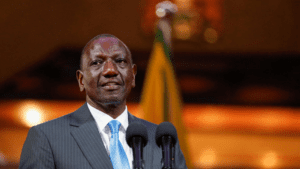
- The proposed changes seek to extend the retirement age of the Secretary General from 60 to 65 years, sparking intense debate.
- JS representatives strongly objected to the amendments, citing procedural flaws and lack of consultation.
- The controversy comes amid existing turmoil within KUPPET, including leadership conflicts and legal battles.
The Kenya Union of Post-Primary Education Teachers (KUPPET) found itself at the center of a storm during its 26th Annual Delegates Conference held in Vihiga County. Delegates, including observers from the Junior School (JS) sector, engaged in an impassioned debate over proposed amendments to the union’s constitution. Central to the contention was a proposal to extend the retirement age of the Secretary General from 60 to 65 years. While the amendment was presented as a measure to ensure continuity in leadership, it has exposed underlying divisions within the union.
The Proposed Retirement Age Amendment
The suggested constitutional amendment aimed to revise the retirement age for the Secretary General, effectively allowing the current officeholder to remain in leadership for an additional five years. Proponents of the change argued that extending the tenure would bring stability and allow experienced leaders to continue steering the union through challenging times. However, critics, particularly the JS delegates, voiced strong objections.
JS Delegates’ Objections
Observers from the Junior School division were unequivocal in their opposition to the proposal. They contended that the amendments lacked transparency and procedural fairness. According to them, the proposals were not adequately discussed across the union’s 47 branches in Kenya.
“Constitutional amendments should undergo thorough consultation,” stated one JS delegate, emphasizing that the current process fell short of this standard. The JS representatives further argued that the changes appeared rushed and potentially self-serving, undermining the interests of teachers at large.
This lack of broad-based consultation, they claimed, not only violated democratic principles but also risked alienating key stakeholders within the union. The delegates also questioned the legitimacy of proposing such a significant amendment without extensive debate and consensus-building across all union branches.
Broader Leadership Tensions
The retirement age debate is the latest in a series of leadership disputes within KUPPET. The union has been grappling with internal discord, most notably the removal of Ronald Tonui from his position as Assistant National Treasurer. This controversial decision was contested in court, with Tonui securing a court order to block his ouster. The incident highlighted deep-seated divisions and governance challenges within the union.
For some delegates, the proposed amendment represents yet another example of leadership prioritizing personal interests over the collective good. The ongoing wrangles have raised questions about the union’s ability to function cohesively and address the needs of its members effectively.
The Secretary General’s Defense
Amid the uproar, the Secretary General defended the proposed amendments, framing them as part of a broader strategy to modernize the union’s governance structure. He pointed to the need for greater inclusivity, including improved representation for women and persons living with disabilities.
“The proposed changes aim to enhance inclusivity within the union’s national executive board,” the Secretary General explained. He dismissed the objections raised by the JS delegates, asserting that their role as observers did not grant them the right to vote or actively participate in the proceedings.
The Secretary General’s remarks further polarized opinions, with some delegates accusing him of dismissing legitimate concerns. Critics argued that inclusivity should not come at the expense of transparency and due process.
Procedural Concerns Raised
A central grievance among the JS delegates was the perceived procedural shortcomings in introducing the amendments. They claimed that key stakeholders were sidelined, and the proposals were hurriedly brought to the conference without prior circulation or discussion at the grassroots level.
“If decisions of such magnitude bypass the union’s foundational structures, it sets a dangerous precedent for governance,” one delegate remarked. The absence of prior engagement, they argued, undermined the spirit of democracy that should guide the union’s operations.
The Importance of Dialogue
Despite the heated exchanges, there appears to be a shared recognition of the need for dialogue. The Secretary General announced plans to convene a consultative meeting aimed at addressing the concerns raised by the JS delegates and other stakeholders. This gesture, while welcomed by some, was met with skepticism by others, who questioned the sincerity of the leadership’s commitment to inclusivity and transparency.
Navigating KUPPET’s Future
The ongoing dispute underscores the broader challenges facing KUPPET as it seeks to navigate an increasingly complex landscape. The union, which represents a significant segment of Kenya’s teaching fraternity, plays a crucial role in advocating for teachers’ rights and welfare. However, internal divisions and governance issues threaten to undermine its effectiveness.
To regain trust and cohesion, KUPPET must prioritize transparency and inclusivity in its decision-making processes. Building consensus among all stakeholders, from grassroots members to national leaders, will be essential in fostering unity and advancing the union’s agenda.
Lessons for Union Governance
The KUPPET saga offers valuable lessons for union governance. At its core, the dispute highlights the importance of robust democratic processes and stakeholder engagement. For unions to remain effective and credible, they must uphold principles of accountability and inclusivity.
Key takeaways include:
- Prioritize Consultation: Major decisions should involve extensive consultation with all stakeholders to ensure legitimacy and buy-in.
- Foster Transparency: Transparent processes build trust and minimize the risk of disputes.
- Strengthen Democratic Structures: Upholding democratic principles is vital for maintaining credibility and unity.
- Address Internal Conflicts Proactively: Resolving disputes swiftly and amicably prevents divisions from escalating.
As KUPPET grapples with these challenges, there is a growing call for reforms within the union. Members are urging the leadership to adopt a more inclusive and transparent approach to governance. This includes ensuring that constitutional amendments and other significant decisions are subjected to thorough scrutiny and debate.
Conclusion
The debate over the retirement age amendment has brought underlying tensions within KUPPET to the forefront. While the proposal’s merits continue to be debated, the controversy serves as a reminder of the importance of democratic principles and stakeholder engagement in union governance. Moving forward, KUPPET’s leadership must work to rebuild trust and unity among its members, ensuring that the union remains a strong advocate for teachers’ rights and welfare.


